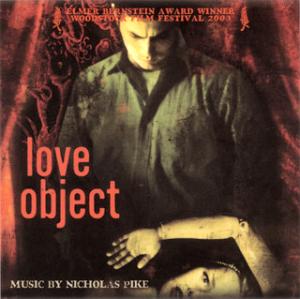Love Object
Music composed by Nicholas Pike
Available on Nicpick Records (49409-2)
Running Time: 56:02

This is a do-it-yourself, low budget piece of ingenuity, the kind of thing that would not have been out of place in the 1980s - and that alone gives it a certain nostalgic appeal - despite the fact that the score has all too obvious melodic shortcomings.
The piano and synthesizer based 'Main Titles' with its lively jauntiness and a quirky sensibility creates an off-kilter ambience that pervades the entire work, and when the composer utilises his electronics on smaller, more intimate cues they work quite well. It's only on pieces such as 'Romantic Dinner' when he attempts to create a bigger, more lush sound that the inadequacies show through. Although Bazouki, Autoharp and special Cello effects are all featured, it's piano that dominates this dark, often disturbing score. As the majority of the cues are relatively short, under two minutes in length, there is a fragmented feel to the work with plenty of ambient sound and tinkling piano ('The New Office', 'A Sex Doll?'), all very internal but also generally lacking in any real dramatic bite. There are also tracks of quirky Rhythm and Blues like 'The Big Box', which may appeal to admirers of playful histrionics, while other pieces such as 'Doll Date', devised as a twisted love theme, develop the central motif first heard in the 'Main Titles' without ever really achieving anything that lingers in the mind. Much of the rest of the score is given over to soundscape suspense and horror cues ('Talking Doll', 'Closing in' ) that will probably add to the unnerving atmosphere of the film itself but do little to entrance the ear.
Too limited melodically and thematically to create a lasting impression but effectively unsettling in pure film music terms, Nicholas Pike's score is a dependable enough piece of work that in the final analysis just does not amount to anything that will stand-up to close scrutiny. Another example of music best left within the safe confines of its true home, the film itself.
This is a do-it-yourself, low budget piece of ingenuity, the kind of thing that would not have been out of place in the 1980s - and that alone gives it a certain nostalgic appeal - despite the fact that the score has all too obvious melodic shortcomings.
The piano and synthesizer based 'Main Titles' with its lively jauntiness and a quirky sensibility creates an off-kilter ambience that pervades the entire work, and when the composer utilises his electronics on smaller, more intimate cues they work quite well. It's only on pieces such as 'Romantic Dinner' when he attempts to create a bigger, more lush sound that the inadequacies show through. Although Bazouki, Autoharp and special Cello effects are all featured, it's piano that dominates this dark, often disturbing score. As the majority of the cues are relatively short, under two minutes in length, there is a fragmented feel to the work with plenty of ambient sound and tinkling piano ('The New Office', 'A Sex Doll?'), all very internal but also generally lacking in any real dramatic bite. There are also tracks of quirky Rhythm and Blues like 'The Big Box', which may appeal to admirers of playful histrionics, while other pieces such as 'Doll Date', devised as a twisted love theme, develop the central motif first heard in the 'Main Titles' without ever really achieving anything that lingers in the mind. Much of the rest of the score is given over to soundscape suspense and horror cues ('Talking Doll', 'Closing in' ) that will probably add to the unnerving atmosphere of the film itself but do little to entrance the ear.
Too limited melodically and thematically to create a lasting impression but effectively unsettling in pure film music terms, Nicholas Pike's score is a dependable enough piece of work that in the final analysis just does not amount to anything that will stand-up to close scrutiny. Another example of music best left within the safe confines of its true home, the film itself.
Mark Hockley
2
Return to Index